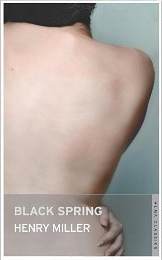No Feather Dusters
by Jo WildingI want a world where the vagina is represented by a crude, honest slit […] I’m sick of looking at cunts all tickled up, disguised, deformed, idealized.
This is not Cindy Gallop, but Henry Miller, writing in the early 1930s. Little wonder then that Black Spring, published in Paris in 1936 – it was banned from the US until the 60s on the grounds of obscenity – doesn’t make for the most comfortable of reading experiences. A genre-defying fusion of memoir, poetry, and philosophy, Black Spring takes the reader on a journey from Brooklyn (‘The 14th Ward’) to Paris, via the vortex of Miller’s mind. Gritty, ‘no holes barred’ prose, it challenges you to see the world and language afresh.
The energy and int ensity of the writing is irresistible in places. In Mexico, for instance,
ensity of the writing is irresistible in places. In Mexico, for instance,
[…] it’s always high noon, and what glows is fuchsia and what’s dead is dead and no feather dusters. You lie on a cement bed and you sleep like an acetylene torch. When you strike it rich, it’s a bonanza. When you don’t strike it rich, it’s misery, worse than misery.
Did I mention that we were in stream-of-consciousness territory? Miller has a poet’s way with words. Readers should leave preconceptions about prose narrative at the door and approach the writing with the most open of minds. Expect to be surprised, disgusted, repulsed, bored (some episodes are better than others), baffled, entranced – and amused. Read ‘A Saturday Afternoon’ and you’ll never see taking a piss (Miller would abhor a euphemism such as ‘urinating’) in the same way.
Part of what makes Black Spring an unsettling read is the instability of the author-reader relationship. Is Miller taking the piss? Is he having a joke at our expense, playing with language and his readers’ expectations? This would seem to be the case in ‘The Angel is my Watermark!’ which charts, in witty and glorious detail, the creation of a watercolour ‘masterpiece’. And how seriously can we take his colourful diatribes on humanity’s diseased condition? These are tantalising questions which go unanswered. We become like Miller himself:
I have never been able to draw a balance. I am always minus something. I have a reason therefore to go on.
Miller’s name is inevitably associated with the obscenity trials surrounding the publication of his earlier work Tropic of Cancer in the US in 1961, in light of which readers might come to Black Spring expecting a romp. Be warned: Lady Chatterley, this is not. Erotic content is thin on the ground, and raw as the winter weather. More cement bed than feather duster.
Black Spring by Henry Miller. Published in paperback by Alma Classics Ltd on 21st June 2012 £8.99

